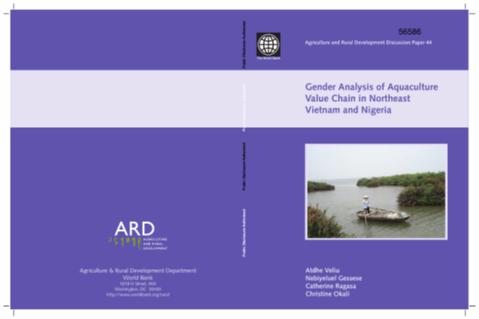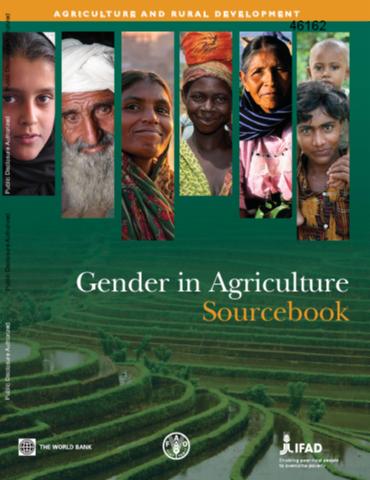Investment Efficiency and the Distribution of Wealth
The point of departure of this paper is that in the absence of effectively functioning asset markets the distribution of wealth matters for efficiency. Inefficient asset markets depress total factor productivity (TFP) in two ways: first, by not allowing efficient firms to grow to the size that they should achieve (this could include many great firms that are never started); and second, by allowing inefficient firms to survive by depressing the demand for factors (good firms are too small) and hence factor prices.
Gender Analysis of Aquaculture Value Chain in Northeast Vietnam and Nigeria
The report is an initiative of the Agriculture and Rural Development Department (ARD) of the World Bank. Aquaculture is the fastest-growing food sector in the world and is expected to contribute more than 50 percent of total fish consumption by 2020. Just over 90 percent of aquaculture production originates in Asia, and nearly 70 percent in China alone. Efforts to expand aquaculture production to meet the ever increasing worldwide demand for seafood continue.
Gender in Agriculture Sourcebook
Three out of every four poor people in developing countries live in rural areas, and most of them depend directly or indirectly on agriculture for their livelihoods. In many parts of the world, women are the main farmers or producers, but their roles remain largely unrecognized. The 2008 World development report: agriculture for development highlights the vital role of agriculture in sustainable development and its importance in achieving the millennium development goal of halving by 2015 the share of people suffering from extreme poverty and hunger.
The evolving landscape of REDD+ projects
The landscape of REDD+ projects varies significantly across countries, reflecting differences in land tenure systems, drivers of deforestation, recent experience with conservation programmes and governance capacity. Indonesia appears to have the most REDD+ projects in the pipeline, with a substantial portion seeking to establish additionality, permanence and a legal claim to carbon by obtaining concessions. In Brazil, two common strategies are to initially seek carbon credits from afforestation or reforestation and to develop local-level payments for environmental services (PES) schemes.
When REDD+ goes national: a review of realities, opportunities and challenges
The development of national REDD+ strategies has progressed. Common challenges include establishing appropriate national institutions that link into ongoing processes; ensuring high level government commitment; achieving strong coordination within governments and between state and non-state actors; designing mechanisms to ensure participation and benefit sharing; and establishing monitoring, reporting and verification (MRV) systems. The different agendas of actors involved in policy formulation at the national level reflect those at the international level.
Analysis of the Soybean debate : a case study on the debate about labor conditions in Brazil
Samenstellen van landelijke kaarten met landschapselementen, grondeigendom en beheer : technisch achtergronddocument bij de opgeleverde bestanden
Het doel van dit onderzoek is voor het Planbureau voor de Leefomgeving het actualiseren van een landelijke grondprijskaart 2001 en een landelijke eigendomskaart 2004. Om te komen tot een landelijke eigendomskaart hebben we diverse bronbestanden verzameld en bewerkt. De gegevens van het Kadaster zijn het meest voor de hand liggende bronbestand, maar deze kwamen door de hoge verstrekkingskosten niet in beeld voor dit project.
Laos and the making of a 'relational' resource frontier
This paper seeks to reconsider the contemporary relevance of the resource frontier, drawing on examples of nature's commodification and enclosure under way in the peripheral Southeast Asian country of Laos. Frontiers are conceived as relational zones of economy, nature and society; spaces of capitalist transition, where new forms of social property relations and systems of legality are rapidly established in response to market imperatives.
The global drylands imperative: Devolving resource rights and the MDGs in Africa
The paper analyzes a sample of existing or in-formulation policy frameworks governing access and security of tenure over major natural assets such as land, forests and wildlife. The fundamental question that runs through the analysis in the paper concerns the extent to which security of resource tenure can mediate the achievement of the MDGs. The overall objective is to apply existing knowledge on land-related development and land rights into principles of policy formulation and implementation processes.








